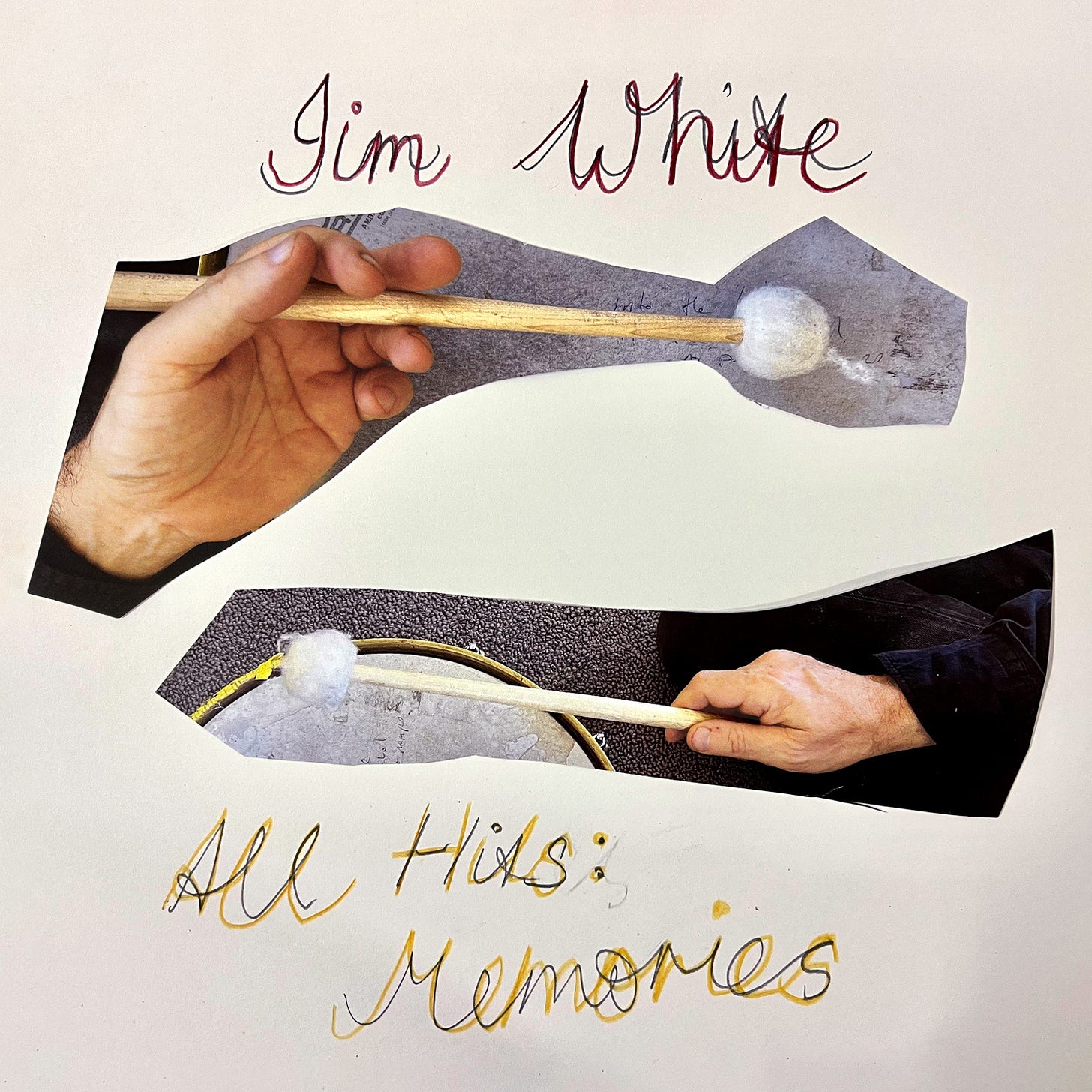At6 — Jim White Goes Solo with "All Hits: Memories"
NEW YORK | “This album sets time free, lets it frolic, lets it graze, lets it remember.”
WORDS AND INTERVIEW BY MICHAEL ZARATHUS-COOK
There are quite a few unique features to drummer Jim White’s All Hits: Memories. For one, the thirteen songs on the album average a length of about 120 seconds—ranging from short kinetic explosions of sound to full atmospheric orchestrations. For a drum album, it is noticeably un-drumlike, at least in the conventional sense of what a kit can do and what White has done across three decades of collaborations with the like of Cat Power, Mary Margaret O’Hara, PJ Harvey, Bill Callahan, Bonnie “Prince” Billy and others. A decidedly unconventional concept album is, of course, not novel, but sifting through the layers of All Hits will reveal to the listener an album that isn’t trying to be unconventional. For White, it came easy. From the experimental song-lengths, synthetic arrangements, and meandering percussions that staggers all over the album’s soundscape—all of it felt seemingly effortless and native to a musician that’s embodied a lifetime of hits across kit and keyboard.
Perhaps the most unique feature of the album can be found in the liner notes: this marks White’s first foray as a solo act. The usual trajectory is to start solo and later discover the charm of collaboration. It was the inversion of this trajectory ─ especially after so long a career of adding drums to other people’s “drumless song” ─ that caught my eye with the announcement of this album’s release (Out March 29 on Drag City). That, and the ubiquity of his name across so many folk and folk-adjacent projects over the last two decades, from Smog’s A River Ain’t Too Much to Love to, the latest album by Phosphorescent, Revelator.
Despite its abbreviated length, the album covers a dazzling amount of creative ground in various directions. In one moment it is soft and ethereal under the cool glide of producer Guy Picciotto’s sound engineering, and in another it erupts in a caterwaul of rattling snares and wailing cymbals. So much so that an honest attempt to summarize the arc traced by this album can easily devolve into artful incoherence. It’s that kind artfully crafted dissonance that makes Callahan’s foreword to the album a treat read:
This is long overdue. I mean, looooooonnnnnng overdue. A solo album by Jim.
The trap kit—so straightforward, so mysterious. What’s inside those things? Air and light—from which century? Which continent? Depending on how and when you hit them, it can be a vibration sent through a prehistoric breath… the dead, wet leaves you walked through on the way to the first day of school. These are the memories of the drums on this record. Infinite and personal. Editing each other as they muscle to the front or soft shoe to the shadow. Drums are the instrument where you can feel the presence of the player the most—the full body—and sense the thoughts of the player the most. The instrument with the most choices to be made sends out the most brainwaves. A bouquet of brainwaves is on this LP.
Jim oversees it all, surveys from the lost place we’re in, the void – the drumless song. We trust. We trust, Jim. His big green eyes search for the right tool (mallet, brush, etc), eyes that search you like you’re a song he wants to join, wants to see if he can add to or understand.
Before humans, drums were playing – these drums. Genesis was a solo drum piece. After humans, these drums, this album. Someone – the last man – is out in a spaceship at the edge of space. He plays a single chord on a synth to set time free from its bind and then lets go. This album sets time free, lets it frolic, lets it graze, lets it remember.
This is a record of thoughts, memories, surgery. A deft surgical operation you may not even realize is happening as it’s happening but you’re back on your feet when it’s over. Memories refreshed. —Bill Callahan
Similarly, my interview with White was a jambalaya of contrasting topics ranging from the interplay of music-making and muscle memory, to such ineluctable questions as, “when do you know a song is finished?”, to the intractable surreality of memories. It’s only fitting then that we present this conversation less as an interview and more of a solo exploration of the various elements that came together for this album—scored to “Names Make the Name” the 10th song on All Hits.








